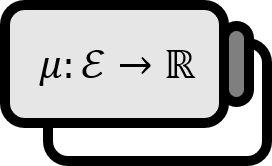Absolute Continuity of Measures
Definition 1
Let’s assume given a measurable space $( \Omega , \mathcal{F} )$. If measures $\nu$, $\mu$ satisfy $$ \mu (A) = 0 \implies \nu (A) = 0 $$ for all $A \in \mathcal{F}$, then $\nu$ is said to be absolutely continuous with respect to $\mu$ and is denoted by $\nu \ll \mu$.
Explanation
As the notation $\nu \ll \mu$ suggests, $\mu$ has a strong sense of ‘dominating’ over $\nu$. The question is why we call this ‘absolute continuity’. I have looked for a good explanation for a long time, but for learners at the level of studying real analysis, there is no easier way to understand than proving the following equivalent condition.
Theorem
$\nu \ll \mu$ $\iff$ $\forall \varepsilon > 0$, $\exists \delta > 0 : F \in \mathcal{F}, \mu ( F ) < \delta \implies \nu (F) < \varepsilon $
Proof
Let’s assume that for all $n \in \mathbb{N}$ there exists a sequence $\left\{ F_{n} \right\}_{n \in \mathbb{N}} \subset \mathcal{F}$ that satisfies $\displaystyle \mu ( F_{n} ) < {{1} \over {2^n}}$ and $\nu (F_{n}) > \varepsilon$.
If we set $\displaystyle A : = \bigcap_{n \in \mathbb{N}} F_{n}$, then $\mu (A) = 0$, but $\nu (A) \ne 0$, hence, there is a contradiction with $\mu (A) = 0 \implies \nu (A) = 0$.
$(\Leftarrow)$
If we set $\forall \varepsilon > 0$ about $\delta = \varepsilon$, $$\mu (A) = 0 \implies \nu (A) = 0$$
■
See Also
- Absolute continuity of real functions
- Absolute continuity of measures
- Absolute continuity of signed measures
Bartle. (1995). The Elements of Integration and Lebesgue Measure: p84. ↩︎
